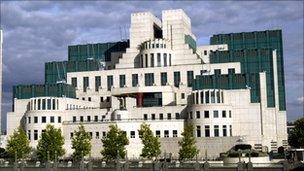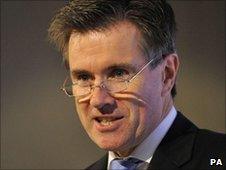Spies facing budget squeeze and more oversight
- Published

The Intelligence and Security Committee wants more powers to oversee agencies such as MI6
The committee that oversees the work of Britain's intelligence agencies, such as MI5 and MI6, says it is "out of date" and should be given broader powers to look into operational matters.
The Intelligence and Security Committee wants a wider remit and says it must change in order to maintain public confidence in the agencies. Gordon Corera looks at the implications of its report and the challenges ahead.
Times are changing for British intelligence.
For much of the last 10 years since the attacks on 11 September 2001, they have been growing at a rapid pace - MI5, for instance, doubling in size.
The last decade has also seen greater controversy surrounding their work - whether over Iraq and its absent weapons of mass destruction, questions over the treatment of detainees, or whether the 7 July 2005 attacks could have been prevented.
The latest Intelligence and Security Committee (ISC) annual report makes clear that spies are not immune from the latest budget squeeze and that they also now may be subject to increased oversight.
Appearing before the committee, the head of MI6 warned that budget cuts meant that it would be 'quite hard' to maintain the capability of the Secret Service.

MI6 chief Sir John Sawers says cuts will affect its investigative reach
Sir John Sawers told the ISC that, even though his budget settlement had been "reasonable", it would be a difficult year ahead with a 10% reduction in staff.
"The aspiration of some ministers that we can provide answers to a whole series of intelligence requirements has to be limited, has to be contained, because we are not going to be able to do that," he told the committee.
MI6 should be able to meet the present set of requirements set for it but will not be able to contribute to looking at the global economy in a way that Sawers would have liked.
In a speech last week, the former head of MI6, Sir Richard Dearlove, called on the service to do more on this very subject.
He said it should not be "squeamish" at looking at spying on other countries to uncover useful information on the future of the euro or other country's economic positions.
In its annual report, the committee argues that the 11.3% reduction in budgets for British intelligence agencies "will inevitably have an impact on the ability of all three agencies to maintain current levels of coverage of all aspects of the threat".
'Losing talent'
The concern over money also extends to securing the new cyber world.
GCHQ director Iain Lobban also says he is having trouble retaining sufficient numbers of suitably-qualified internet specialists.
"I need some real internet whizzes in order to do cyber," he told the committee.
"They will be working for Microsoft or Google or Amazon or whoever. And I can't compete with their salaries. I can offer them a fantastic mission, but I can't compete with their salaries.
"But I probably have to do better than I am doing at the moment, or else my internet whizzes are not going to stay… and we do have a steady drip, I am afraid .
"Month‑on‑month, we are losing whizzes who'll basically say 'I'm sorry, I am going to take three times the salary and the car and whatever else'."
The committee argues the Cabinet Office may have to look at bonuses for those with specialist skills.
Technically, the work of the ISC covers areas such as policy, administration and finances, but not operations.
That is one area where the Committee is now making a push for more power.
Confidence and credibility
The ISC report, external includes a call for major changes to its oversight function.
This comes because of questions over whether the current arrangements do enough to provide accountability and public confidence in the work of the UK's spies.
Reports like today's may give a sense of where the money gets spent but not what the agencies really do.

There were concerns over the power of the ISC to properly investigate 7/7
Each of the three major controversies over the last decade - Iraq, detainees and 7/7 - were initially investigated by the ISC.
But, in each case, questions surfaced over whether the ISC managed to get to the bottom of events, and later inquiries either found out considerably more or, in the case of detainees, remain pending.
In the case of 7/7, there were real concerns, as indicated by the coroner, that the ISC had not been given correct information during its inquiries.
There have also been rows between the previous ISC and the Cabinet Office over how independent it was.
The danger was that - without reform - the credibility of the ISC would continue to be called into question, undermining confidence that intelligence agencies were properly accountable.
The result, announced in the committee's report, has been a push to change the standing of the committee and increase its independence from government, as well as its powers to investigate.
This, the committee argues, should include formal oversight of operations and the ability to require rather than request information.
These recommendations, like the budget squeeze, may be uncomfortable for some in British intelligence but there also may be a realisation that both developments are inevitable.
- Published13 July 2011
- Published13 July 2011